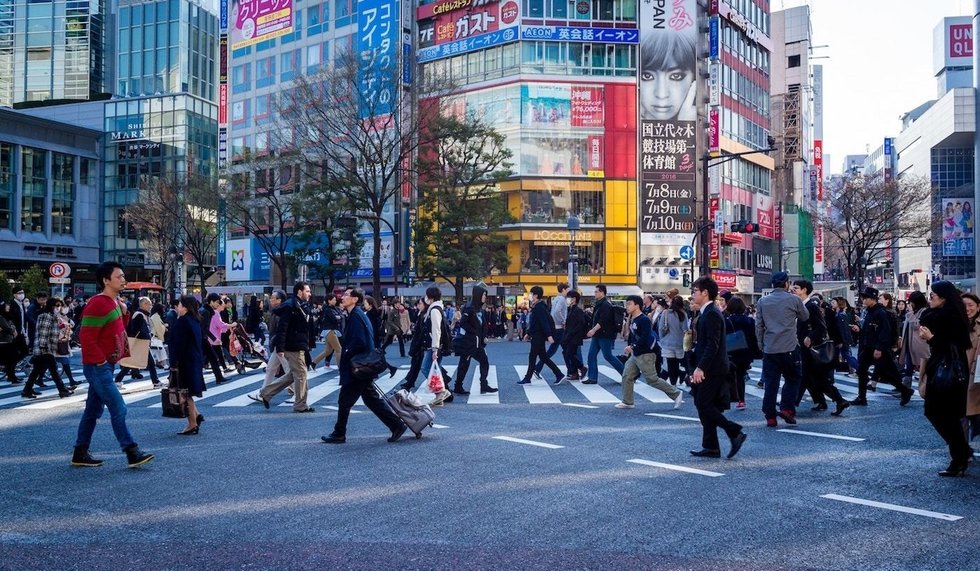Japan: Where Employees Are Killing Themselves (literally) to Succeed at Work
Sep 02, 2019
8 mins


Freelance @ Communication numérique
“She was discovered at home, still clinging to her phone,” confided the mother of Miwa Sado to journalists from the Franco-German television network Arte in a 2018 report. In 2013, Sado, a 31-year-old Japanese journalist died from a heart attack, having worked nonstop for several months, including putting in sometimes up to more than 200 hours’ overtime each month. In 2017, her employers, the public broadcasting organization NHK, admitted liability: Her death had been caused by karoshi 過労死, which literally translates as “death from work.” This term covers heart attacks, strokes, and suicides: In the fiscal year ending March 2017, 191 Japanese citizens died from karoshi. While commonly held assumptions about Japanese society are widespread, this is a phenomenon that is troubling a growing number of people in Japan and around the world. But how could this happen? Why does Japanese society glorify work to such an extent? Is the situation in Japan really as catastrophic as reports are indicating? We look further into the story.
Work as personal fulfillment and sacrifice for the common good
We must go back to the fifth and sixth centuries, and to Japanese society’s adoption of Shinto and Buddhist doctrines, to understand the importance placed on the value of work in modern-day Japan. It is where the foundations of Japanese society were laid, with the collective taking precedence over the individual, attention to detail being laid out as an imperative, and the arrival of Confucianism from China happening around the same time. This new movement imparted two values to Japanese culture—humanity and respect for hierarchy, especially for elders, the importance of which is still felt today. In addition to these various influences, we must mention Suzuki Shosan (1579-1655), who played a major role in shaping Japanese workplace culture. This samurai-turned-Buddhist monk added a new dimension to Zen philosophy: Self-realization would only come from devoting oneself entirely to one’s work, in the same way that one invests oneself in Zen meditation. He declared that this was the only way to give the very best of oneself, and that work was a sacred mission that came directly from the gods, following the polytheistic worldview of the Shinto religion.
Work thus became life’s ultimate goal and not simply a way to earn money. “Among the Japanese, work has become a spiritual path through which humanity can achieve its salvation,” explains Etsuo Yoneyama, a professor of Japanese and intercultural communication at Emlyon Business School, France. “The quality of work demonstrates the spiritual quality of the man.” Work also made it possible to move beyond self-interest, because it put the individual at the service of the common good. In contrast to what could be seen happening in Europe during the same period, with the emergence of capitalism, work was not a way to demonstrate personal success, but to achieve nothing less than inner peace. It should be noted that 1868 was the beginning of the Meiji era—or the opening of Japan to the outside and industrialization—when Shintoism became the state religion and was subsequently impossible to avoid.
“Among the Japanese, work has become a spiritual path through which humanity can achieve its salvation”—Etsuo Yoneyama, professor at Emlyon Business School
Toyotism, productivity, and overtime
Fast-forward to the period following the Second World War, when Japan had been left devastated by two atomic bombs and was under American occupation. This dark period was not to last long: The country, along with its economy, was rebuilt in record time. Through their hard work and drive, and also their famous lean production system known as Toyotism, the Japanese people proved themselves to the world and were held up as an example to follow. This transformation is even referred to as the “Japanese miracle,” since the country became the world’s second-largest economy in the late 1960s.
While many factors might explain this dramatic growth in the Japanese economy—increased private investments and such an abundance of labor that companies could guarantee lifetime employment—economists have pointed out that the model itself would nonetheless be difficult to export. “In Japan, unions are part of the company with which they are associated, representing only the full-time employees and defending the interests of that company first and foremost,” say the economists Henry Houben and Marc Ingham in their 1995 paper, “What System Will Replace Fordism?”. And yet, the side effects of this system are apparent: Satoshi Kamata, after having spent five months with factory workers in Japan, described it in his book, Japan in the Passing Lane: An Insider’s Account of Life in a Japanese Auto Factory, painting a vivid picture of hellish production rates and employees who are encouraged to work harder and harder in the name of enterprise.
“In Japan, unions are part of the company with which they are associated, representing only the full-time employees and defending the interests of that company first and foremost”—Henry Houben and Marc Ingham, economists
Staying late: a modern-day issue
Another leap forward, this time to 2018: Globalization, the digital revolution, and the 2008 financial crisis have all passed through the country, but labor legislation has not. Corporations are no longer able to guarantee lifetime employment, the holy grail of Japan’s labor market. Positions are therefore harder to come by, and young employees are usually willing to do anything to keep such security, not least because promotions are based on seniority. As a result, newcomers have to put in countless hours of overtime because the workload is simply too much for one person. “Sometimes I leave work at 11 PM because I still have many things to do and I can’t come into the office the next day without having finished all my work,” explains Eri, a 25-year-old who is employed at a private school that offers English and computer programming classes to children. Another reason, however, is pure presenteeism—“I stay in the office until 10 PM, killing time on Yahoo! News, since there is no way I can leave before my manager,” says Yuki, an office worker.
Furthermore, many contracts are vague, not only on the subject of the desired hours in a working week—which should not exceed 40 hours, even if overtime is allowed—but also regarding the precise tasks assigned to new employees. “I was supposed to be in charge of the company’s communications,” says Eri, “but seeing as I was the only employee who was proficient in English, on top of that I also had to organize classes, write, and correct the children’s homework, and even give classes whenever the main teacher was absent. It was very difficult because I didn’t feel comfortable with these new tasks, which were so stressful for me that I ended up suffering from burnout.”
“Sometimes I leave work at 11 PM because I still have many things to do and I can’t come into the office the next day without having finished all my work”—Eri, employee at a Japanese school
A challenging professional world
These testimonies are remarkable, considering the fact that the country is suffering a worrying labor shortage, which has even forced it to open its borders. Contrary to what such a move suggests, employees are far from being in a stronger position than employers. Furthermore, in addition to overtime, there are many expectations that can quickly turn a professional life into a nightmare. These can include repeated and almost-mandatory after-work drinks with colleagues, to prove one’s devotion to the collective and sense of belonging to the so-called company “family,” as well as a “fat tax,” and a requirement to conform as much in attire as in attitude. Women must wear a dress suit, men a suit and tie, and raising one’s voice is out of the question, as is criticizing colleagues or superiors. These rules are unfathomable for foreign employees based in Japan; however, they are implicit and, for the most part, reserved only for the Japanese. On this topic, Antoine, a French university researcher who has lived there for eight years, tells us: “Foreigners enjoy more flexibility. For example, if any of my Japanese colleagues had a shaved head it would be seriously frowned upon, but in my case, it’s less of an issue.”
“Foreigners enjoy more flexibility. For example, if any of my Japanese colleagues had a shaved head it would be seriously frowned upon, but in my case, it’s less of an issue”—Antoine, a French researcher based in Japan
This anxiety-provoking atmosphere can lead to some very problematic situations, as it fosters workplace harassment in many instances. Without taking it as far as karoshi, many Japanese employees still suffer at work. In 2015, there was an explosion in the number of complaints lodged of workplace bullying by superiors: More than 60,000 cases of moral harassment were identified by the Ministry of Health. Nevertheless, even this staggering number does not paint the whole picture in a country where the culture of silence is still very much upheld. Between stress, fatigue, and workplace harassment, it is perhaps easier to understand hikikomori, the avoidance of social contact, typically by Japanese adolescents, who withdraw from the world by shutting themselves away in their rooms. Incapable of coping with the pressures of Japanese society, they cut off all contact with reality, and live through their computer and the internet, far from the world.
And what about Japanese women?
The Japanese labor shortage might indeed suggest that women are welcome in companies. Furthermore, in 2013, Prime Minister Shinzo Abe launched his womenomics program with pomp and circumstance, including a slogan that clearly set the tone: “For a society where women can flourish.” The objective? To have women filling 30% of decision-making positions by 2020. He also later promised 500,000 additional daycare places to support working mothers. It is an ambitious goal, considering that gender equality is not mandatory in companies, not to mention politics, and that young women are expected to resign after they get married, as are pregnant women.
As Ahiko, a 35-year-old woman who runs a start-up, explains, “Women are supposed to resign after marriage. However, if they don’t have a child, they can continue to work. If they become pregnant, they must be stay-at-home mothers until their child is five. This isn’t law, of course. It’s more an implicit rule.” It’s worth noting that, in a system where seniority is the main criterion for being promoted, mothers who follow this rule will be at a genuine disadvantage when it comes to their careers. While some Japanese women find themselves in this situation, others fight to keep working—and sometimes pay a high price for it. Sayaka Osakabe, a victim of matahara, or workplace bullying of pregnant women aimed at getting them to resign, suffered two miscarriages due to maternity harassment by her superior. She created Matahara Net, a support group for other victims, and campaigns for mothers and other women to have the right to pursue both a professional and family life. To all this is added, as everywhere else in the world, the risk of sexual harassment: After the #MeToo movement, Japan has not been left behind, most notably seen with the resignation of its vice finance minister in April 2018, following the revelations of several journalists.
“Women are supposed to resign after marriage. However, if they don’t have a child, they can continue to work. If they become pregnant, they must be stay-at-home mothers until their child is five. This isn’t law, of course. It’s more an implicit rule”—Ahiko, Japanese entrepreneur
A world that is slowly changing
But not everything is dark in the Land of the Rising Sun. While the public authorities and companies could do more for the wellbeing of employees, a few steps have already been taken. The parliamentarians seem to favor symbolic actions: On the last Friday of every month, employees are encouraged to leave the workplace at 3 PM, and an act has recently been passed that limits overtime to 100 hours per month. At the same time, these measures are not a quick fix, considering that the risk of karoshi increases at 80 hours of overtime a month. Moreover, companies sometimes encourage employees to lie about the amount of overtime they do so they can remain in compliance with the law, and employees increase their hours to compensate for their Friday afternoon of forced leave.
But within each company, individual initiatives are beginning to be implemented. Antoine tells us that his superior has offered university employees an assistance program for pregnant women and mothers with young children. Some companies have also found creative solutions aimed at encouraging employees to go home in the evening, including setting lights to go out at 10 PM and no internet or electricity past that time. The results are sometimes mixed. Employees often bring their own router or a head torch so they can keep working. The most recent experiment: One company is making employees who do the most overtime in a month wear a purple cape—the Japanese equivalent of a dunce’s cap. In a country where other people’s opinion of you is still very important, perhaps that is a key that will be able to open the door to change within Japanese society. Watch this space.
Follow Welcome to the Jungle on Facebook and sign up for our newsletter to receive our articles every week

More inspiration: International

Germany trials the four-day workweek: “Free time is invaluable”
Germany's four-day workweek trial may be the solution to greater productivity, worker satisfaction, and work-life balance.
Jun 10, 2024

The Fuckup Nights movement: The art of sharing failures on stage
Discover the global movement fostering learning, community, and authenticity with Fuckup Nights co-founder Pepe Villatoro.
May 23, 2024

Why is Europe so eager to attract foreign workers?
Looking for work abroad? Now might be your chance. The European Union is facing labor shortages, prompting efforts to attract foreign workers.
May 22, 2024

What if working less isn't the answer?
For sociologist and researcher Julia Posca, "It's not just about working less, it’s mainly about working better."
Apr 10, 2024

Hangover leave? Pawternity PTO? Explore the world’s quirkiest paid leave initiatives
Need time off for your birthday, a breakup or simply a lack of motivation? In some countries, it's possible.
Apr 04, 2024
The newsletter that does the job
Want to keep up with the latest articles? Twice a week you can receive stories, jobs, and tips in your inbox.

Looking for your next job?
Over 200,000 people have found a job with Welcome to the Jungle.
Explore jobs